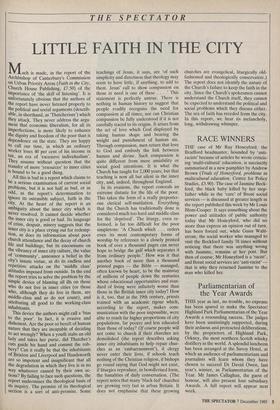THE SPECTATOR
LITTLE FAITH IN THE CITY
Much is made, in the report of the Archbishop of Canterbury's Commission on Urban Priority Areas (Faith in the City, Church House Publishing, £7.50) of the importance of 'the skill of listening'. It is unfortunately obvious that the authors of the report have never listened properly to the political and social arguments (describ- able, in shorthand, as `Thatcherisml which they attack. They never address the argu- ment that economic liberalism, for all its imperfections, is more likely to enhance the dignity and freedom of the poor than is dependence on the state. They are happy to call our time, in which an ordinary worker loses 40 per cent of his income in tax, an era of 'excessive individualism'. They assume without question that the transfer of more 'resources' to inner cities is bound to be a good thing. All this is bad in a report which claims to be a serious examination of current social problems, but it is not half as bad, or as 1:). dd, as the report's determination to ignore its ostensible subject, faith in the city. At the heart of the report is an ambiguity about the inner city which is never resolved. It cannot decide whether the inner city is good or bad. Its language of crisis, despair, misery suggests that the inner city is a place crying out for redemp- tion, as does its information about poor church attendance and the decay of church life and buildings; but its encomiums on the vibrancy of inner city culture, the value of 'community', announce a belief in the city's innate virtue, as do its endless and repetitive attacks on the 'middle class' attitudes imposed from outside. In the end the report tries to solve the problem by the simple device of blaming all ills on those who do not live in inner cities (or those who, although they do live in them, are middle-class and so do not count), and attributing all good to the working-class Inhabitants.
This device the authors might call a 'bias to the poor'. In fact, it is evasive and dishonest. Are the poor so bereft of human nature that they are incapable of deciding to act wrongly? When a youth stabs an old lady and takes her purse, did Thatcher's cuts guide his hand and commit the rob- bery? Can it really be that the inhabitants of Brixton and Liverpool and Handsworth are so impotent and insignificant that all the degradation in which they live is in no way whatsover caused by their own ac- tions? By failing to face such questions, the report undermines the theological basis of its inquiry. The premise of its theological section is a sort of anti-premise. Some teachings of Jesus, it says, are 'of such simplicity and directness that theology may seem to have little, if anything, to add to them. Jesus' call to show compassion on those in need is one of these . . . .' This statement is perfectly untrue. There is nothing in human history to suggest that people readily recognise the need for compassion at all times; nor can Christian compassion be fully understood if it is not carefully traced to its origins. It arises from the act of love which God displayed by taking human shape and bearing the weight and punishment of human sin. Through compassion, men return that love to God and embody the link between human and divine. Such compassion is quite different from mere amiability or social good intentions. It is what the Church has taught for 2,000 years; but that teaching is now all but silent in the inner city, and, indeed, throughout England. In its evasions, the report conceals an extreme distaste for the life of the poor. This takes the form of a really preposter- ous clerical self-mutilation. Everything that the Church has traditionally done is considered much too hard and middle-class for the 'deprived'. The liturgy, even re- formed, is far too difficult for the poor simpletons: 'A Church which . . . orders even its most contemporary forms of worship by reference to a closely printed book of over a thousand pages can never hope to bridge the gulf which separates it from ordinary people.' How was it that another book of more than a thousand printed pages — the Bible — managed, often known by heart, to be the mainstay of millions of people down the centuries whose educational opportunities and stan- dard of living were infinitely worse than those in the British inner city today? How is it, too, that in the 19th century, priests trained with an academic rigour which, according to the report, makes com- munication with the poor impossible, were able to reach far higher proportions of city populations, far poorer and less educated than those of today? Of course people will not come to church if their churches are demolished (the report describes asking inner city inhabitants to help repair chur- ches as an 'embarrassment), if clergy never enter their lives, if schools teach nothing of the Christian religion, if bishops go round saying that God might not exist, if liturgies reproduce, in bowdlerised form, the banalities of daily conversation. (The report notes that many 'black-led' churches are growing very fast in urban Britain. It does not emphasise that these growing churches are evangelical, liturgically old- fashioned and theologically conservative.) The report does not identify the nature of the Church's failure to keep the faith in the city. Since the Church's spokesmen cannot understand the Church itself, they cannot be expected to understand the political and social problems which they discuss either. The sea of faith has receded from the city. In this report, we hear its melancholy, long, withdrawing whimper.


































































 Previous page
Previous page